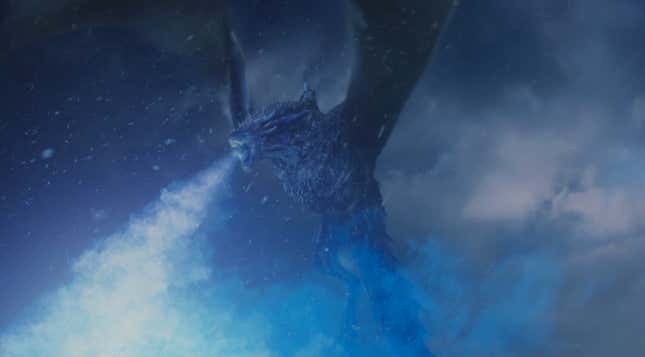
There seemed to be a point to all that sprawl, for a while. Or at least a theme. Or anyway that is what I told myself!
In those early seasons, the first two especially, when Game of Thrones’s story—like just quantitatively, just the sheer amount of story, the numbers of characters and locations and relationships and motivations and conflicts and shit—seemed to grow logarithmically with each episode, it seemed to be observing something, or some things, about violence and political vacuums, about how feudal hierarchies, if not all others, assign to the petty who’s-fucking-who intrigues of unaccountable, degenerate elites the potential for uncontrollable runaway destruction, and thus grave political importance. The Stark family scattered, and then causes and effects just kept scattering them, farther and farther apart; each conflict knotting into a new one or two or three; complications blooming and compounding madly and unpredictably along what would be, in your typical genre narrative, the literal or figurative roads between literal or figurative plot locations; the story sprouting wild new branches to follow whole new characters met along the way. It seemed to be arguing that its story had to be told this way, because there was no other honest way to tell it; that the explosive sprawl of the story, ultimately, was the subject of the story: This is what happens to this world when the events of the previous several thousand years resolve themselves in this one drunken shitbrain’s choice to hire his best buddy as his right-hand man.
This was the theory I settled on anyway, when I discovered, to my horror, that it suddenly seemed important to know who the fuck Edmure Tully was.
This is a fine, if insane and impossibly ambitious, thing for a boobs-and-dragons TV show to try to be about. But it was never going to end—spoiler alert, the books, George R. R. Martin’s A Song of Ice and Fire series, will never end and it’s fine to stop waiting for them to—because there simply is no practical way to end a story being told in those terms. All that can happen is whatever happens next, and whatever happens after that, and whoever gets roped into it, and whichever one of their close relatives they’re canoodling when they get roped in, and so on, forever. Whether the author(s) know(s) it or not, a story being told in those terms ultimately is a story about an entire world and everyone in it, and entire worlds don’t end as neatly as, say, a story about a handful of hobbits who set off to deposit the One Ring in the Cracks of Doom. You can’t even end it with an apocalypse, because nothing bears more clearly the fingerprints of the author, reaching in to impose a word-limit on things, than an apocalypse, and that’s not what this story is about.
But eventually they were gonna have to end it. It’s TV, actors age and get bored and want to move on, production budgets explode out of all proportion to the good that any show, even one as popular as Game of Thrones, can do its network. It’s no good getting mad at anybody for the choice to make a big V with their arms, gather up all the pieces scattered and somehow reproducing all across a huge and somehow endlessly expanding board, and begin sweeping them all back together into a pile so that this damn thing could ever just end.
And so the story—and sometimes, when it must, the map also—has been contracting, violently, for at least the past couple seasons. The issue, as no shortage of observers have noted already, is what this does to that sprawl, how it reaches back and changes what the sprawl seemed to be about. The story of Arya Stark, for example, branched out crazily in the aftermath of her father’s death—the ways that it intersected with and influenced other storylines could not even be summarized here in fewer than 2,000 words—but now that there is nowhere near enough remaining time to, for example, truly work to fit the House of Black and White and the Faceless Men into the wider world, her entire detour to Braavos has been reduced to, essentially, a training montage in a revenge movie: How Arya Stark Became A Badass Killer. And with only six measly episodes remaining for the show to gather up however many footballs it can, spike them as quickly as possible, and perform a few hurried touchdown dances while the credits roll, Arya herself almost certainly can only be resolved into what’s left of the story as an accessory to the question of which of a tiny handful of characters will win the big game. The Starks are the Avengers, now, and Arya is The One Who Can Flip Faces And Do Wild Ninja Stabs. (Black Widow?)
This sort of dynamic is was already in effect all across the story even before season seven began. Tyrion, for another example—one of the early seasons’ most dynamic characters—had to resolve to Daenerys’s dull, angsty Jiminy Cricket guy; there’s nowhere else to fit him in, as the story shrivels around him and the only real questions the show’s stewards left themselves space to settle are “Who’s gonna win the big game?” and “Who’s gonna get killed?” and “Will any new combinations of relatives do sex with each other?” There’s no time for anything less dumb, and less room than ever for characters who haven’t been empowered with swordsmanship or dragons or armies or giant zombie henchmen to settle the big, bombastic, deeply silly action set-pieces that, if season seven was any indication, will have to make up basically all of the remaining plot developments.
So it’s gonna be stupid! It’s gonna be something like seven hours of big dumb nonsense. I just wanted to put that out there.